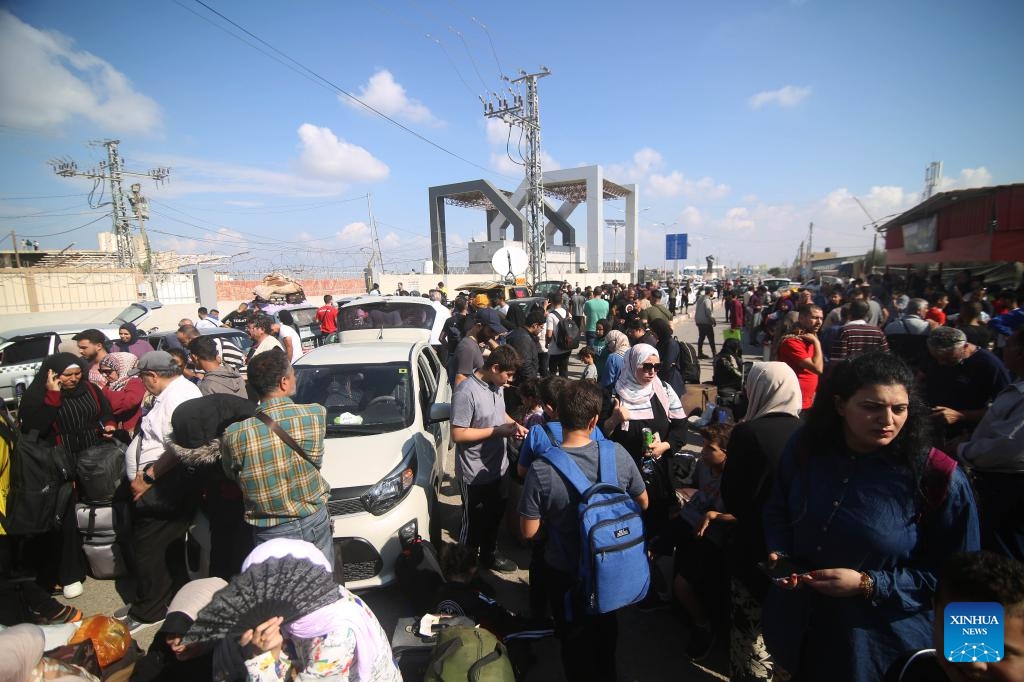Biden to travel to Israel in show of solidarity

As US President Joe Biden is about to travel to Tel Aviv on Wednesday in a show of support to Israel as it prepares for a ground offensive in Gaza and with the aim to mitigate the expansion of the conflict between Israel and Hamas, analysts urged the US to shoulder its responsibility as a major power to act as a fair and impartial mediator and bring the two-state solution back on track.
US Secretary of State Antony Blinken, who announced Biden's trip to Tel Aviv, described it a demonstration of "US solidarity with Israel and our ironclad commitment to its security." During the meeting with Israelis, Biden also plans to hear what Israel will need to safeguard their security, Blinken said.
Before Biden reaches Tel Aviv, several US officials including Blinken and the top US military commander in the Middle East Gen. Michael E. Kurilla, have been engaging with senior Israeli officials in the country. The military commander is looking to "gain a clear understanding of Israel's defense requirements," according to the general's headquarters.
Ding Long, a professor at the Middle East Studies Institute of Shanghai International Studies University, told the Global Times on Tuesday that the purpose of Biden's visit to Israel is clear: Showing support to Israel, while working to prevent the conflict from escalating and spilling over to larger areas. What is worth noting is that these goals are not being worked toward out of consideration for Palestine's interests but to serve the interests of the US, he said.
An uncontrollable Middle East means the US will have to haul the focus of its global strategy back to the region. Additionally, an escalated situation in the region will lead to skyrocketing oil prices and may exert a negative impact on the upcoming election next year, which all in all is not what the US is looking for, Ding explained.
According to the White House, besides of meeting with Netanyahu and other Israeli leaders, Biden's trip will be followed by a stop in neighboring Jordan, where he will meet with Jordan's King Abdullah, Palestinian Authority President Mahmoud Abbas and Egyptian President Abdel Fattah el-Sissi.
Using international justice and international laws to address the Israel-Palestine conflict cannot be put into practice if the US fails to timely correct its Middle East policy and stop its one-sided support of Israel, and instead act as a fair and impartial mediator and bring the two-state solution back on track, Ding told the Global Times.
The current round of conflict is the result of the US policy of putting the cart before the horse in the Middle East, for which the US should be held responsible. It is time for the US to reflect and correct its long-time failed Middle East policy, which has led the Middle East peace process astray, Liu Zhongmin, a professor at the Middle East Studies Institute of Shanghai International Studies University, told the Global Times.
Chinese experts urged the US to increase its promotion of Israeli-Palestinian peace talks and investment in the peace process, rather than trying to normalize Arab relations with Israel while the Israeli-Palestinian issue has not been resolved.
According to Al Jazeera, 10 days of bombing Gaza has caused widespread destruction of local schools and hospitals and displaced nearly 1 million people.
The latest news from the BBC on Tuesday showed that more than 1,300 people in Israel have been killed by Hamas since October 7 and more than 2,700 people have died in Israeli retaliatory strikes in Gaza.
Regarding the current situation, China calls for a cease-fire and an end to the fighting as soon as possible in order to prevent it from spreading indefinitely and to avoid further deterioration of the situation, Zhang Jun, China's permanent representative to the UN, said after the UN Security Council on Monday failed to adopt a resolution proposed by Russia that would have called for a humanitarian ceasefire in Gaza and condemnation of all violence and hostilities directed against civilians.
Five UN Security Council members voted in favor of the draft resolution, four members voted against it, and six members abstained. The proposal must receive at least nine votes in favor for the UN to adopt a resolution, with none of its five permanent members opposing or casting a veto, according to the UN.
The Chinese envoy expressed disappointment that the UN failed to pass a resolution on the Palestinian-Israeli issue but voiced support for the UN to continue to play its role and responsibility in prompting humanitarian aid.
Some Western countries joining hands to vote against the UN resolution has thwarted the role the UN Security Council should bear to maintain international peace and security and resolve the current crisis, Ding said, highlighting that humanitarian aid should not be politicized.
A most urgent task is to prevent the humanitarian catastrophe from worsening, however some Western countries are still attempting to leave more space for Israel to retaliate against Hamas. Their sinister intentions will not help the ceasefire nor ease the humanitarian disaster, Ding noted.
While addressing the ongoing?crisis, the international community must adhere to the fundamental direction of the two-state?solution, work for?broader consensus?and formulate a timetable and road map to that end, the Chinese envoy noted.